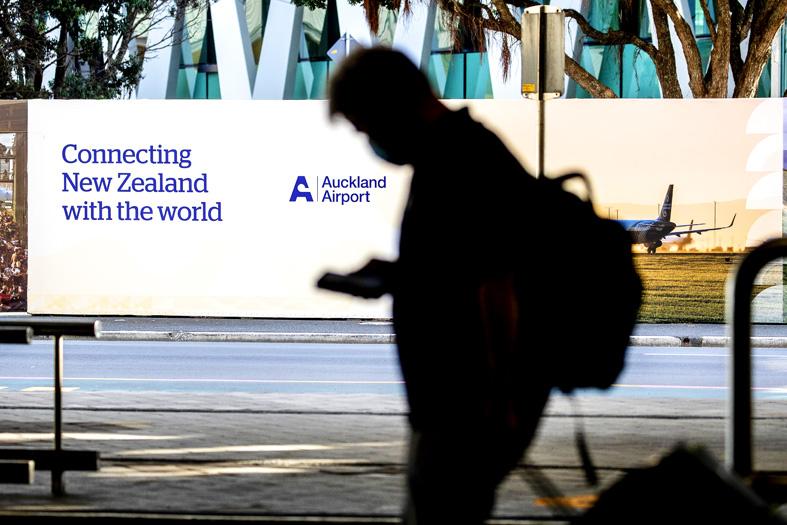New Zealand’s borders yesterday fully opened for the first time since they abruptly snapped shut to keep COVID-19 out in March 2020.
New Zealand Prime Minister Jacinda Ardern said the nation was “open for business” after the final stage of the phased reopening, which began in April, was completed on Sunday night.
Visitors from around the world are once again allowed into New Zealand, including maritime arrivals, those on student visas and those from non-visa waiver countries, such as China and India.

Photo: AP
The reopening was “an enormous moment” Ardern said yesterday in a speech at the China Business Summit.
“It’s been a staged and cautious process on our part since February, as we, alongside the rest of the world, continue to manage a very live global pandemic, while keeping our people safe,” she said.
“New Zealanders are hosts. Manaakitanga [hospitality] streams through our veins and we open our arms to tourists and students, including from China, which prior to 2020 was New Zealand’s largest source of international students, and second-largest source of tourists,” she said. “For those looking to make their journey here, haere mai, we welcome you.”
Cruise ships and foreign recreational yachts would also be allowed to dock at the country’s ports.
New Zealand Minister of Tourism Stuart Nash said the return of cruise ships — whose guests spent NZ$365 million (US$231 million onshore a year prior to the COVID-19 pandemic — would be a big boost for local economies.
“Most cruise visits are during the warmer months of October to April... It will be full steam ahead for the industry, who can plan with certainty for the rest of the year and beyond,” Nash said in a statement.
Tourism operators, businesses and educational providers have welcomed the news, despite predictions from Immigration New Zealand that visitors are more likely to trickle — than flood — in over the next few months.
“I think it’s safe to say we’re not expecting the same level of demand we saw pre-COVID. That’s probably for a number of reasons,” Immigration New Zealand head Simon Sanders told Radio New Zealand.
“We know that China, who’s a larger visitor visa-required country, is still subject to a range of travel restrictions so we’re not expecting large demand from there, at least initially,” he said.
He encouraged students who have offers of study to apply immediately for their visas, and urged those looking to study in the country next year to hold off for a couple of months “so we can assure that those that need to arrive this year will be able to do so.”
The full reopening comes as New Zealand is sitting within the top seven countries in the world for average daily confirmed COVID-19 cases per 100,000 people, Johns Hopkins University data showed.
A University of Auckland study released last week warned that the border reopening could see foreign-seeded COVID-19 cases rise four-fold — and that could put further strain on an already creaking health system.

DOUBLE-MURDER CASE: The officer told the dispatcher he would check the locations of the callers, but instead headed to a pizzeria, remaining there for about an hour A New Jersey officer has been charged with misconduct after prosecutors said he did not quickly respond to and properly investigate reports of a shooting that turned out to be a double murder, instead allegedly stopping at an ATM and pizzeria. Franklin Township Police Sergeant Kevin Bollaro was the on-duty officer on the evening of Aug. 1, when police received 911 calls reporting gunshots and screaming in Pittstown, about 96km from Manhattan in central New Jersey, Hunterdon County Prosecutor Renee Robeson’s office said. However, rather than responding immediately, prosecutors said GPS data and surveillance video showed Bollaro drove about 3km

Tens of thousands of people on Saturday took to the streets of Spain’s eastern city of Valencia to mark the first anniversary of floods that killed 229 people and to denounce the handling of the disaster. Demonstrators, many carrying photos of the victims, called on regional government head Carlos Mazon to resign over what they said was the slow response to one of Europe’s deadliest natural disasters in decades. “People are still really angry,” said Rosa Cerros, a 42-year-old government worker who took part with her husband and two young daughters. “Why weren’t people evacuated? Its incomprehensible,” she said. Mazon’s

‘MOTHER’ OF THAILAND: In her glamorous heyday in the 1960s, former Thai queen Sirikit mingled with US presidents and superstars such as Elvis Presley The year-long funeral ceremony of former Thai queen Sirikit started yesterday, with grieving royalists set to salute the procession bringing her body to lie in state at Bangkok’s Grand Palace. Members of the royal family are venerated in Thailand, treated by many as semi-divine figures, and lavished with glowing media coverage and gold-adorned portraits hanging in public spaces and private homes nationwide. Sirikit, the mother of Thai King Vajiralongkorn and widow of the nation’s longest-reigning monarch, died late on Friday at the age of 93. Black-and-white tributes to the royal matriarch are being beamed onto towering digital advertizing billboards, on

POWER ABUSE WORRY: Some people warned that the broad language of the treaty could lead to overreach by authorities and enable the repression of government critics Countries signed their first UN treaty targeting cybercrime in Hanoi yesterday, despite opposition from an unlikely band of tech companies and rights groups warning of expanded state surveillance. The new global legal framework aims to bolster international cooperation to fight digital crimes, from child pornography to transnational cyberscams and money laundering. More than 60 countries signed the declaration, which means it would go into force once ratified by those states. UN Secretary-General Antonio Guterres described the signing as an “important milestone,” and that it was “only the beginning.” “Every day, sophisticated scams destroy families, steal migrants and drain billions of dollars from our economy...